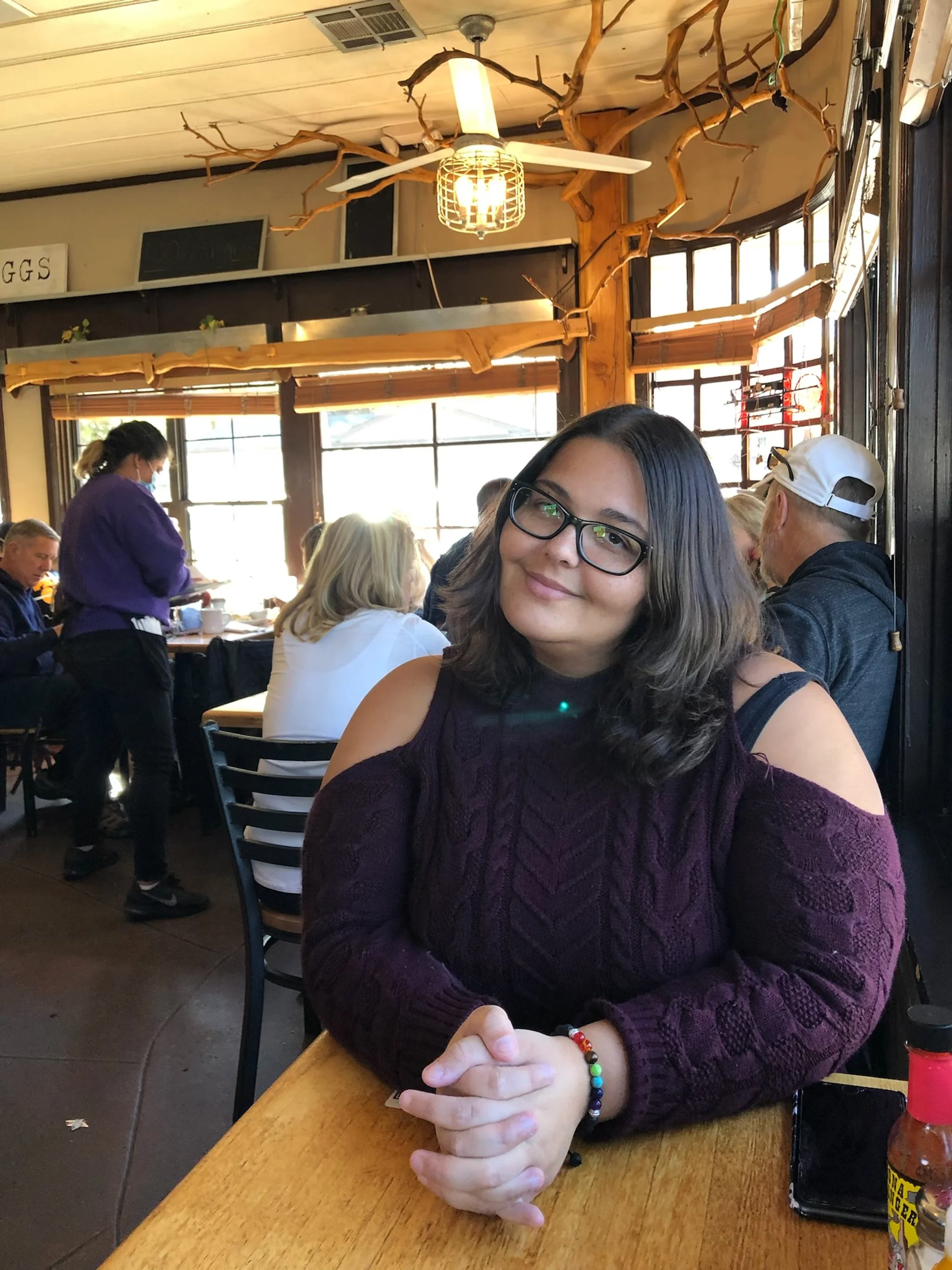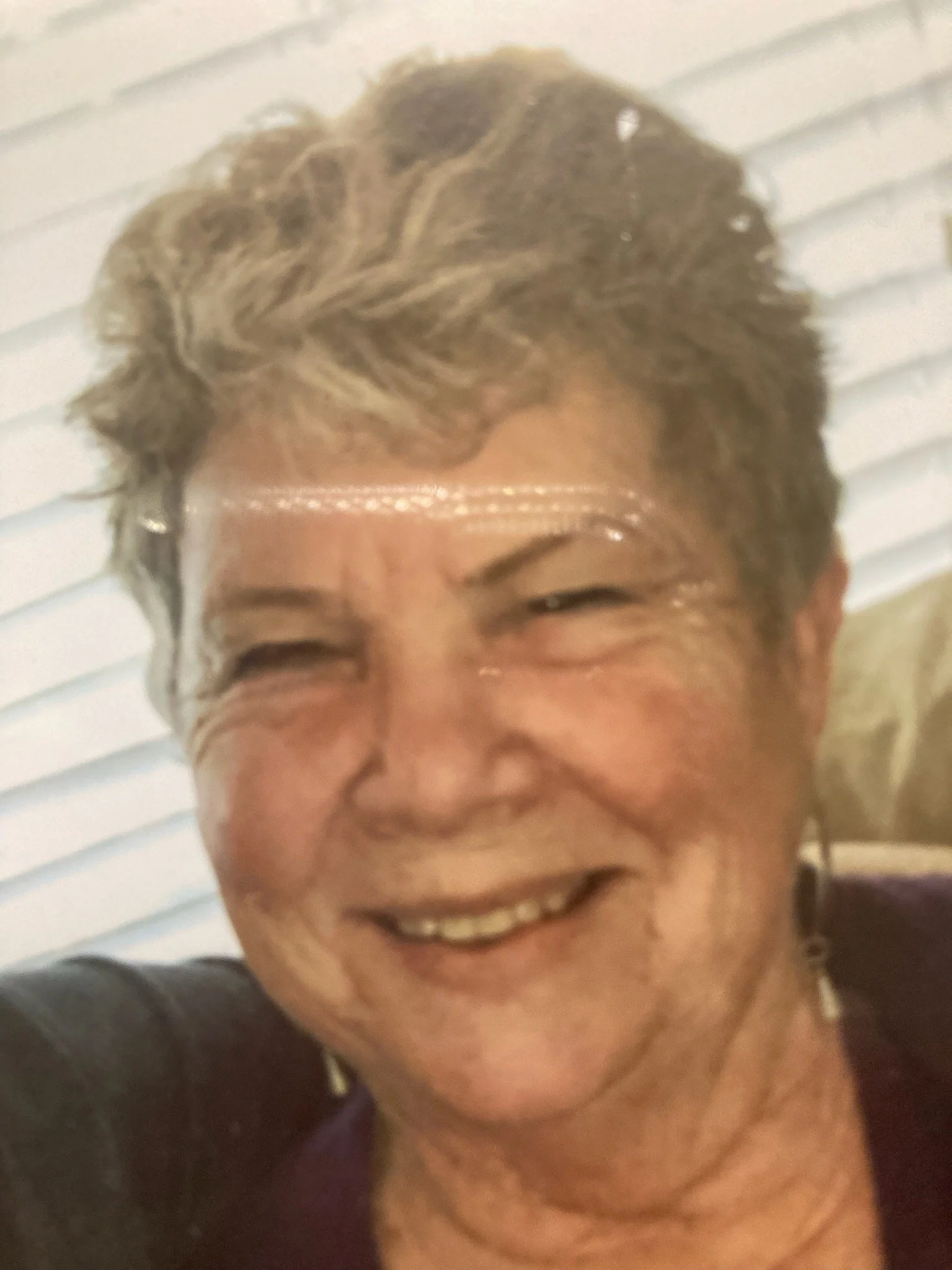
We blog regularly and post items we feel maybe of interest to our wonderful clients; check back regularly to see what we have posted.
Visual Impairment and Its Effects on Mental Health
Check out our latest vlog HERE!
Nora talks through visual impairments and their effects on mental health. Learn tips and tricks for working through impairments and how to improve your mental health today!
I have a passion for singing with people and helping them find a sense of hope in their most vulnerable moments. I believe that everyone has a right to be heard and validated. I use a client-centered, collaborative approach allowing the person the opportunity to discover the barriers that keep them from living their best life. In addition, I serve as a guide for the client to reach their own personal goals.
I enjoy working with people of all ages, including children, teens, and adults. My therapeutic space is always compassionate and non-judgmental to allow a safe and comfortable place to navigate and explore what is needed.
I am a member of the California Association of Marriage and Family Therapists (CAMFT).
5 tips on effective communication
Communication is so important with all relationships including friendships, colleagues, family and romantic relationships. We not only want others to listen to us, but we want to be HEARD. There is a difference between talking and communicating, and we have to learn how to communicate effectively. Let’s talk about 5 easy and effective communication tips that can transform your relationships.
Let’s talk! No really, Let’s talk!
Communication is so important with all relationships including friendships, colleagues, family and romantic relationships. We not only want others to listen to us, but we want to be HEARD. There is a difference between talking and communicating, and we have to learn how to communicate effectively.
So we all understand the desire to be heard, right? But HOW does that playout in relationships? How do we make sure we give others the space to be heard? Well, I’m so glad you asked, because we’re diving into some helpful and easy communication tips! You ready? I challenge you to practice these simple and effective tips + tricks and see how your communication is positively affected!
Alright, let’s get to it…
5 tips on effective communication
1. Listen to one another- give your partner the chance to both talk and listen and reflect on what your partner says. The key to how to communicate in a relationship is often not in the actual verbal communication at all – it’s in the way we listen to our partner. It is also important to request clarification if we are not sure what our partner is saying.
2. Remain open- It is easy at times to bottle things up but discussing issues together so you can tackle them together is important. It is also important to say what you mean and be clear. It will also help with self-awareness and being able to admit when you are wrong and working through it to move forward.
3. Identify your communication style- The four main communication styles are passive, aggressive, passive-aggressive and assertive. Passive communicators are the ones who find it hard to say “no”. aggressive communicators are often very intense and loud and have trouble making connections with others. Passive aggressive communicators tend to avoid conflict and will use sarcasm as ways to avoid it. the healthiest way is assertive which is communicating feelings clearly and calmy.
4. Be present- putting time aside to talk to your partner that is uninterrupted and intentional so that they feel the relationship and the communication and connection is a priority.
5.“I statements”- these take the blame and accusatory statements off your partner and still let you express how you are feeling. It also helps us own our own feelings and take responsibility for our actions.
So give it a go + try out these easy and effective communication tips. I hope you notice that you’re a better listener and that you feel heard by those around you. Happy communicating my friends!
~Courtney
I became a therapist because I want to help people who are struggling to change their lives. I work with clients in a caring and compassionate manner, and I tailor the treatment to fit their needs and goals. You are the most important part of your treatment - it needs to relate to your life in a way that works for you. I will challenge you to overcome the challenges you see in your life with support and positive feedback. My approach is working collaboratively toward a happier life for you by helping you make positive changes, including increasing your self-awareness and those barriers that have come between you and your goals.
My specialties include working with teens, pregnancy and infant loss, anxiety, depression, PTSD, and self esteem issues.
Insomnia: The Struggle Within
Tired, like all of the time, because you just can’t sleep. Anxious, stressed, and unsure where to turn? If you struggle with insomnia, you’re not alone. Insomnia is one of the most common disorders in individuals. With all of today’s stress, at least 25 % of adults and children struggle with getting a good night’s sleep. We’ve got some handy tips & tricks for getting better shut eye.
Insomnia is one of the most common disorders in individuals. With all of today’s stress, at least 25 % of adults and children struggle with insomnia.
The most common causes of insomnia include stress, an irregular sleep schedule, poor sleeping habits, mental health disorders like anxiety and depression, physical illnesses and pain, medications, neurological problems, and specific sleep disorders If you struggle with insomnia (a condition that causes trouble falling asleep, staying asleep, or both) it can have a profound impact on your quality of life, leading to fatigue, trouble concentrating, mood problems, and even an increased risk of accidents while driving.
One way to decrease insomnia is to have a regular daily schedule. This allows you to train your mind for sleep.
The next step is to have proper Sleep hygiene. Staying nice, clean and fresh increases our mood decreases stress and causes us to fall asleep easier and stay asleep longer.
Another suggestion would be to drink tea without caffeine such as chamomile, daily reading before bed help develop a habit of sleep. Avoiding stimulating activities such as video games, television and screen time an hour before bed.
If you struggle with racing thoughts before bed, you should practice writing down in a daily journal your activities throughout the day, how you feel and express emotions and thoughts through journaling.
Another suggestion is to have external noise such as a fan or nature sounds to assist you with falling asleep faster and staying asleep longer.
There also has been suggestions of drinking tart cherry juice before sleep to decrease insomnia.
The new studies published in the European Journal of Medicine at the end of October shows that tart cherry juice can improve the quality of your sleep, your sleep duration, and help reduce the need for daytime napping. A discovery was made that adults who drank two 1 ounce servings of tart cherry juice per day experienced a demonstrable increase in sleep efficiency as well as a 39 minute increase in average sleep duration. (WOW!)
So to recap, if you’re struggling with Insomnia, make a daily list of activities, have good hygiene and shower before bedtime, journal any racing thoughts that you have about your day and any stressors and concerns, eliminate all electronics such as video games and television at least an hour before sleep, it’s suggested to drink a warm cup of tea non-caffeinated, turn on some external sound such as a fan or nature sounds to assist with relaxation. The last suggestion is to try tart cherry juice- which is actually pretty good.
Remember insomnia is normal if it’s not chronic. Everybody faces difficulties in sleeping over the course of their life. However, if this is an ongoing concern and is impairing your daily function due to lack of sleep it is recommended that you seek professional assistance from a healthcare provider such as a medical physician and therapist.
My name is Lisa Jacobs Clark, I am a licensed Marriage and Family Therapist with CCS. I specialize in children, young adults and women that have or are dealing with depression and anxiety. I have a passion for this population. I entered this field of employment to assist individuals struggling with depression, anxiety and life changing events. Besides assisting individuals in areas that they struggle with, I also am an advocate for children and for families. I truly feel that my purpose is to help the community through therapeutic interventions, mentoring and providing unconditional positive regard to all of my clients. My heart continues to be invested in the work that I provide for the community and CCS. Just as all the other therapists at CCS we are committed to provide and help individuals achieve a better tomorrow.
Let's Talk About It: Codependency
Many of us are quite familiar with the word codependency. We often associate it with someone who is “needy” or who relies on others to do every day life. In reality, codependency is far more than just relying on others; it is a maladaptive way of maintaining interpersonal relationships and a skewed view of self. Let’s talk about a few yellow flags of codependency in any relationship…
Let’s Talk About Codependency…
Many of us are quite familiar with the word codependency. We often associate it with someone who is “needy” or who relies on others to do every day life. In reality, codependency is far more than just relying on others; it is a maladaptive way of maintaining interpersonal relationships and a skewed view of self.
How then can we spot a codependent relationship? Well, the answer is not too simple since we often get misinformed through media. Before I suggest a few yellow flags to look for, please keep in mind the following two points:
Shame: it is my belief that shaming people for having patterns of codependency is unfair and harmful. A person with codependent traits is only trying to relate and survive in this harsh world
and
Culture: it is important to recognize that interdependence (a balanced relationship where both parties work together to meet each other’s needs) is not the same thing as codependency.
Those two points set aside, the following are just but a few characteristics (or yellow flags) of codependent relationships and is not an exhaustive list. One last point, as informative as the below information can be, remember to use it as a resource to compliment a responsible discussion with a health care professional.
Yellow flags of codependent relationships and/or codependent tendencies:
Guilt: difficulty saying “no” due to fear of harming other’s feelings
Prioritizing needs: difficulty putting your needs first, before those of others.
Isolation: other relationships and needs are placed second over spending time with the person you are enmeshed with.
Circular relationships: a person needs another person, who in turn needs to be needed
Unsolicited caretaking: when a person feels that they have to care of everyone all the time
Addiction: often, one or both people in the codependent relationship have an addiction problem to substances
Lack of differentiation: difficulty identifying own needs/wants
In life we have balance, thus, if you believe you are in a codependent relationship, know that the opposite exists- you can grow to have healthier relationship patterns! If you recognize a love in the above descriptions, please help destigmatize codependency and provide them with support so that they can find their own path to healing.
If you are interested in obtaining more information, check out the Co-Dependent Anonymous website https://coda.org/meeting-materials/patterns-and-characteristics-2011/
Do not forget to schedule an appointment with a mental health professional
Feel free to contact us by calling 951-778-0230 or texting us at 951-323-2182
As a couples and family therapist, I have vast training and experience working with Children (ages 4 to 12 years old), adolescents (ages 13 to 19 years old), young adults (ages 20 to 35 years old), and middle age/older adults and family therapy. I also have a background working with individuals and families impacted by crime, and have provided crisis intervention/stabilization.
I have a special interest in helping my clients address a variety of mental health concerns, including anxiety, depression, self-esteem, relational issues, women’s health, Latinx, grief/loss, autism, overall life transitions, issues concerning LGBTQIA+ community, trauma and PTSD. I have worked in multiple settings including schools, community mental health agencies and private practice.
I graduated from the California School of Professional Psychology at Alliant International University with an MA in Marriage and Family Therapy and an emphasis on Latin American Family Therapy. I provide psychotherapy services in both English and Spanish.
If you are curious about what therapy can look like but unsure it is for you, I would love to discuss options to address your current situation.
What Does Thanksgiving Look Like?
What does it look like to be thankful, have traditions, and gather with others in a Covid-19 world?
Thanksgiving evokes from me a time to sit around a table with family and friends and talk about the year's past. Since this time of COVID, I'm aware many of our family and friends may not be present, through illness, or they are fearful of getting together like they once did or fear someone has Covid, and of course, those who are not living any longer as those we had to say goodbye to. So, I ask myself, “What does Thanksgiving look like now?” What does it look like to be thankful, have traditions, and gather with others in a Covid-19 world?
This year has been different in how we are saying goodbye to our loved ones– Hospitals limited us to only one person allowed to visit at a time. Clients have reported hearing the nurses say, "we're sorry there are no admits to this wing at this time."
Another significant change is that we couldn't bury the departed like we used to. We had to do virtual services instead of in-person services. I observed, just last week, a gathering where I live that had been postponed for over six months. Finally, these folks got together in the dining room to say goodbye to the departed loved one; her friends and family surrounded the widow and began singing together. They told tales of her departed husband and brought pictures to talk about him and his life with her. No one should have to wait such a long time to grieve, but we all had to be safe!
I also see from TV and Social media "what the Thanksgiving holiday is supposed to be" –"What it's supposed to look like"
--
the perfect picture: turkey waiting to be sliced up, mashed potatoes, veggies, salad, pumpkin pie -and, I am aware for many folks, they have been living on the street or living with relatives (if that lucky) or those who don't want to live anywhere but on the street, where they say they feel they are safer than cooped up in a rental apartment.
Their Thanksgiving looks very different than my Thanksgiving.
Many people are generous, they choose to work in food banks or feeding the hungry on Thanksgiving. I've been fortunate to never find myself in such straights. And, so I ask myself what "can I really do for the less fortunate ?"
There are many ways I can volunteer in my area: be on the food lines, help prepare a meal, help deliver a meal for that week, listen to elderly neighbors tell their stories, and so forth.
As a therapist, I console others at times, assisting clients when they find themselves alone.
Not all of us have family, spouses, or close friends.
But in this time of COVID, we also are so isolated and alone, especially now as we all try to find some peace and resemblance of normalcy.
As a therapist, I am genuinely interested in "their stories." Stories of family, children, their work lives, now-today lives. Take time to listen. Better yet, If you can extend yourself safely to your neighbors, check in with them in person or on Zoom, call them or Facetime.
Leave a piece of pie for them.
Make that extra time to say hello or share a meal.
We have all had a tough year.
May you enjoy the Thanksgiving you create this Season.
~Judy
Judy provides Clinical Supervision at Central Counseling Services in Riverside. She is a Mother, Grandmother, and GG, and loves the work she does at CCS. She enjoys trainings on the most recent theories in our work, and has specialties of working with First Responders, Trauma victims, and providing workshops on Prevention of Suicide with her colleague Sherry Shockey-Pope. Call us today if you would like to work with Judy.
Visual Impairment and Its Effects on Mental Health
Check out our latest vlog HERE!
Nora talks through visual impairments and their effects on mental health. Learn tips and tricks for working through impairments and how to improve your mental health today!
I have a passion for singing with people and helping them find a sense of hope in their most vulnerable moments. I believe that everyone has a right to be heard and validated. I use a client-centered, collaborative approach allowing the person the opportunity to discover the barriers that keep them from living their best life. In addition, I serve as a guide for the client to reach their own personal goals.
I enjoy working with people of all ages, including children, teens, and adults. My therapeutic space is always compassionate and non-judgmental to allow a safe and comfortable place to navigate and explore what is needed.
I am a member of the California Association of Marriage and Family Therapists (CAMFT).
Nature Therapy
Walking outdoors inspires feelings of awe which gives us a secondary brain boost. We need Nature Therapy to reduce mental overload caused by our busy lives.
“In every walk with nature, one receives far more than he seeks.” - John Muir
Doctors in Scotland are authorized to prescribe nature to patients to help reduce blood pressure, anxiety, increase happiness, treat post-cancer fatigue, obesity, diabetes, mental illness, and much more!! For example, a walk in the country reduces, mental illness, and much more!! For example, a walk in the country reduces depression in 71% of participants according to a study from the University of Essex. By spending 90 minutes a day outside, you can decrease activity in the part of your brain that is associated with depression.
In fact, as little as just five minutes strolling in the park or gardening improves self-esteem, mood, and motivation as per the study!
‘Ecotherapy’ also known as ‘green therapy, ‘nature therapy’, or ‘earth-centered therapy’ is an emerging form of treatment to healing emotionally, physically, and psychologically. It has many benefits such as a boost to our immunity and a reduction in anxiety, ADHD, and aggression. For example, just 30 mins of brisk walking in the sunshine can increase the circulation of natural killer cells, white blood cells, and other immune system warriors.
A Body in Motion Keeps the Mind Active Too! Walking can help bring our attention to the present moment so that we can use all our senses to enjoy the moment. While walking, pay mindful attention to the odor of the wood, or fragrance of the orange blossoms, the sound of the stream, or the chirping of birds. This provides relaxation and reduces stress. Walking outdoors has been recommended because it inspires feelings of awe which gives us a secondary brain boost. We need this in order to reduce the mental overload caused by our busy lives.
If you decide to take a walk in a green environment, be sure to wear appropriate clothing, take along a water bottle for hydration, and protect your skin by wearing sunscreen. Walking outdoors compared to indoors have many more benefits and serves as a mini-therapy allowing both mind and body to reset.
For those who are too busy to walk, try to squeeze in walking during your lunch hour, listen to a podcast, or walk to the grocery store for example. Statistically speaking, less than 5% of the people are performing 30 minutes of physical activity per day. However, our bodies were designed to be moving and not follow a sedentary lifestyle.
Lastly, the law defined by Isaac Newton states that a body in motion will stay in motion and a body in rest will stay in rest. It is, therefore, crucial for us to keep moving our body at least for 30 minutes a day to keep it functioning at optimum. I invite you to think deeply about our connection of the mind-body with nature.
The three levels of Monitoring Your Children
Supervision does not take laser-focused intensity: nor does it take exhausting yourself with keeping them entertained. It calls for three levels of monitoring. Each of these levels is necessary; for them AND for you. In order for you to not drive each other “crazy”. Plus the child receives the full benefit of autonomy and parental interaction!
When it is your time to “watch the kids” it can be exhausting and overwhelming; often keeping you from placing your mind on other things. The real problem is that when it IS your turn… your mind SHOULD be placed ON THE KIDS; rather than your own agenda.
To make this easier, I have a tip that might take the edge off.
Supervision does not take laser-focused intensity: nor does it take exhausting yourself with keeping them entertained. It calls for three levels of monitoring. Each of these levels is necessary; for them AND for you. In order for you to not drive each other “crazy”. Plus the child receives the full benefit of autonomy and parental interaction!
First Level: Monitor from a distance. This allows independent activity for them and the opportunity for you to sit (one of my favorite things, next to crawling in bed). All you do is keep an eye out for trouble in the form of strangers, accidents, and conflicts with peers. This is the time for you to do something like phone calls. Something that can be accomplished without having to take your eyes off your children. This form of supervision encourages creative, independent thought and resiliency.
Second Level: Be a cheerleader. This brings you in (Yes, you have to actually get up and move closer to them.) close enough to laugh with them as they enjoy themselves, encourage them when they are learning a new skill, and intervene if they get in a jam. It also allows you to get to know the other kids that may be around. This is helpful to encourage shy children and build self-esteem.
Third Level: Interactive Parallel-Play (sitting with and doing the same thing, but separately, while monitoring for behavior and safety.) or Cooperative Play (working on the same project, game, or activity together, while monitoring for behavior and safety.). Get in there with them! Climb, pretend, twirl, swing, color, but, most importantly… interact! DO NOT nag, chide, complain, fuss or insult them! Nobody likes having their feelings hurt and nobody likes a fun-sucker! Have fun with them, at their level!
Share in their world of imagination and play. It is a rich, rewarding world that is just as important, and meaningful, as yours! This step encourages bonding and often we transmit our family and personal values to our children as we play.
Play is good for all of us.
My hope is that you take pleasure in monitoring your little ones, learning their ins and outs, and playing with them. They will thrive and grow stronger knowing that you take joy in the time you spend with them!
Why being a therapist is better for me than being almost anything else
I heard a Minister, when I was about 14 years old, who really set a fire in my soul. He talked about humanity, and the need for folks to help each other in life.
My jobs were being a mom, a secretary, an aide to children in school, and a “parent advocate” but eventually, the call to be a therapist was strong. It took hours, years, to get through school to learn this trade/ministry/service.
In this service of being a therapist, it encompasses counseling, addiction counseling, play therapy, relationship building with families and couples, and helping those in need. I get to help folks work on mindfulness, person-hood, mental health, spirituality, emotions, principles, anxiety, philosophy, self-worth, and their place in the community and world.
I’ve learned through the years this "therapist gig" is what I was called to do, and this by far is the most rewarding career, personally, to me. Good colleagues, clients who want to make life long changes in their lives, or just a small change - to be happier and more fulfilled in their work.
Something that matters to me a lot is that this is a great way to create something that can be quickly be passed on to others. My heart lights up when I am able to supervise younger folks who also want to be therapists - no matter what the age, right out of a Master’s Program and in their 20’s, or those who have a second or third career, and enter this magnificent arena.
I have had great therapists too, one in high school during a very dark time in my life, and one in my 30’s. These two women had helped me’ in very different ways but they helped me and I wanted to help others as they had.
The act of sitting and facing a client, and the interactions and conversations, are more than just a friend across the table, but a communion of minds and hearts mending trauma, bringing forth a sense of hope to the client and a willingness to reach and grow in life.
I am grateful to have been doing this work for the last 35 years. And also grateful that I do a job that I feel passionate about, in the service of others.
Judy McGehee, LMFT, works out of the Riverside office at Central Counseling Services. She is passionate about helping people. Judy is understanding, kind and has a good ear for just listing. She feels that therapy can help if we are willing to try. To talked to Judy call us to set up an appointment.
"The Martial Therapist"
I got home that night full of bruises, tired as hell, and I noticed a growing pain in my wrist…
Have you ever just woken up in the morning and decided, “No, not today”. Well if you’re like me, then that happens more often than you’d like. I think at some point that happens to all of us. We just wake up and for whatever reason (you could be tired, stressed, lonely, overwhelmed, hungry, etc.) you decide that today is just not going to be your day and there’s nothing anyone or anything can do to turn it around. The funny thing about those days is that they tend to come out of nowhere (Ugh, so frustrating!) and the feelings that come along with those days tend to grow out of control quickly. I want to tell you about one of my bad days so that I can (hopefully) show you how I was able to turn it around.
I’m a therapist that practices Cognitive Behavioral Therapy or CBT for short. So I’m basically equipped to handle any situation…good, I’m glad you caught the sarcasm there! But in all seriousness, I make my living showing people that they have the ability to help themselves feel better by teaching them simple tools and strategies. So it’s obvious that I should be perfect at doing those things, too…right? Well I won’t keep you in suspense any longer. I’m not as good as I would like to be. The cool thing about being a therapist is that I am trained how to use all of these wonderful self-help tools, so when I end up not using those tools myself, I get to add an extra serving of guilt to my day. Remember, no matter how hard your therapist works for you, they are working just as hard making sure they have their personal life in order as well. In essence, they have to put on their oxygen mask on before assisting you with yours!
Well that morning, I did not feel like getting up and going to work. I thought to myself, “How the hell am I supposed to help anyone when I feel like this?”. I was slow in every step of my morning routine. I slept in until I absolutely had to get up. I took too long on the toilet. I lingered in the shower…you get where I’m going with this. I did NOT want to do anything and my behavior was telling me as much. Often, when we are feeling off, our behavior will change in subtle (or sometimes not-so-subtle) ways. I we can clue ourselves into these changes, we have the chance to head off the storm! My response was “Screw that”. I was feeling crappy and I wanted to! I knew in my mind that I was doing things to keep myself low, but I just wanted to feel low for a bit and forget all of my training as a therapist. The problem is that little voice in the back of my head nagging me to stop being such a hypocrite. I wondered to myself as I was taking way too long to pack my lunch, “If I was my own client what would I do to help solve this problem?”
The answer is frustratingly simple. Two words…Behavioral Activation. This terribly simple concept can solve so many issues. But when we need it most, it’s the last thing we want to use. Ridiculous, I know. What is Behavioral Activation? Translated into human speech, Behavioral Activation boils down to this…
If you’re feeling crappy, do more stuff and you won’t feel as crappy.
OR
When you engage your body and mind in pleasurable activities, you tend to feel better.
So I did what any begrudging therapist who is aware of their own self-sabotage would do, I made a plan to go beat up my friends that night after work.
I know what you’re thinking (Okay, maybe I don’t really know). But you might be thinking that I’m nuts for saying that and that maybe I should be reevaluating my profession for having these thoughts. I swear, things will make sense soon. You see, every week I go to a self-defense martial arts class that teaches me to use my body as a lethal weapon in case I ever find myself surrounded by some seriously menacing dudes who want to beat me up. I go to the gym and spend two hours every session using my body in ways that I would never dream of using toward another person in my outside life. But for those two hours when I’m in class with the rest of my group, I am free from everything that weighs me down. Let me give you a taste of what a normal session looks like.
We start out by partnering up and hardening our bodies by striking each other on our arms, legs, and stomachs. This is so we can get used to the pain of getting hit by another person. Then we do some light warm up exercises, you know practicing how to apply a choke for maximum effect or which body parts provide the least resistance to breaking. You know, normal, typical, everyday kinda stuff. After that, we usually train some new way to apply pain as a defensive strategy. After that we do some intensive aerobic and strength exercises to make sure that we’re good and tired for the night and so that our bodies will feel something if the hitting somehow didn’t do it.
Now you might be thinking, is that what all therapists do to relieve tension? Do they all just want to hurt other people? No…at least not me. Here’s the thing, when I go to these classes, I am completely free from everything that bothers me. It’s hard to worry about your day when you’re dodging a punch. I can’t be thinking about my stressors and be effective in my fight at the same time, so the stress just has to go. When I go to class, I train with other people who are there to get better and have similar interests to me. I have built a network of friends that are motivated to work hard and are glad for me when I improve. I consider myself lucky to have these people in my life. Each time I go I am working toward something bigger than me and using my body to the point of exhaustion so that when I’m done, I have nothing left but the satisfaction of a job well done (and a few extra bruises and scrapes).
That morning I noticed my behavior had changed, I was mindful of how my thinking was keeping me down, and felt the sting of knowing that I could do something about it. I decided that I would go train that night even harder than normal because I needed to get out of my funk. I messaged my group ( so they could hold me accountable if I didn’t go) and exercised my body and mind.
I got home that night full of bruises, tired as hell, and I noticed a growing pain in my wrist…
…but the only thing I had the energy to do was smile to myself and say “You did it”.
9 Signs Therapy Is Actually Working
Experts break down what progress looks like.
Nicole Pajer On Assignment For HuffPost
eek after week, you may walk into your therapist’s office and pour out your anxieties, hopes and dreams, or you might cry or get angry. Does any of this mean the process is actually working?
According to experts, there are definite signs that show you’re on the right track. If you are experiencing any of the following, it may be safe to say that your weekly counseling sessions are paying off:
1. You’ll look forward to your therapy appointments
Revealing your innermost thoughts in a session can be daunting. But if you get to the place where opening up becomes more comfortable, you may have experienced some breakthroughs, according to Rachel Dubrow, a licensed clinical social worker in Northfield, Illinois. Dubrow said her clients often make the connection that their treatment is working when they no longer feel nervous before appointments.
“They also tell me that they start to feel lighter and better after a session,” she said.
2. You’re not as “in your head”
“I’ve had clients tell me that when they begin to feel better, they aren’t as ‘in their heads’ anymore,” said Christy Doering, a therapist with Sage Counseling in Plano, Texas.
According to Doering, constant rumination over anxieties, listening to your “inner critic” or berating yourself for past regrets takes up valuable real estate in the brain.
“When people start to get well, they give that space to something better. It’s often a new appreciation for the present moment, or more interaction with family and coworkers, but it builds upon itself and contributes to overall wellness pretty quickly,” she said.
3. You’re having fun again
Anhedonia ― which is the inability to experience pleasure from activities that people used to find enjoyable ― is one of the hallmark symptoms of mood disorders like depression.
“If a person loves to sew, fix cars, read or exercise, then when he or she is depressed, those things will stop bringing joy,” Doering said. “But when people are improving, they will one day wake up and realize they feel like doing those things again, and often those things bring even more joy than they did in the past. It’s like having a stomach virus and feeling like you will never want to eat again, but then after it’s over, everything tastes wonderful.”
4. You are focusing on the present
“Instead of worrying about whether or not your first grader will get into college ... or feeling guilty over enjoying that bagel you had for breakfast, you are being mindful of the here and now and tending to the things you are in control of at the moment,” said Kayce Hodos, a licensed professional counselor in Wake Forest, North Carolina.
So rather than stressing about the future, you are focusing on work tasks, listening to a friend over margaritas, taking a walk on your lunch break or enjoying your favorite band’s new album.
5. You’ve changed your standards on who you swipe right for on Tinder
Sheri Heller, a New York City-based psychotherapist, noted that effective therapy may make you shift your focus toward more stable partners. Additionally, it may help you seek out healthier friendships and romantic partnerships.
“As clients work through core wounds rooted in relational traumas and betrayals, their healing is evidenced in using discernment and discrimination with who they bring into their lives,” she said. “Often these new partnerships are completely contrary to the sort of toxic traits they found themselves gravitating toward in the past.”
6. Self-care becomes a priority
Subscribe to HuffPost’s wellness email Your guide to taking care of your mind and body so you can take on the world.
According to Hodos, noticing that you are beginning to pay attention to yourself is a great sign of improvement. This could be as simple as booking a weekly massage, journaling about your thoughts and feelings or asking your boss for that overdue raise.
“Regardless of how it shows up for you, you are positively including some much-needed self-care in your routine, and a bonus is you are enjoying it with no, or at least less, guilt,” she said.
7. You’ve started applying your therapist’s suggestions ― and they’re working
“I know that therapy is working for my clients when they are able to transfer what we have been working on in the therapy room to their lives,” said Sheralyn Shockey-Pope, co-founder of Central Counseling Services.
She cited a couple on the brink of divorce that she treated as an example. “They began to come into sessions with statements like, ‘I remembered that he was hurting, too, and when things got too intense at home we took a timeout, just like we did in therapy,’” she said.
Dubrow agrees, adding that she loves seeing patients gain a sense of pride over properly applying techniques she has armed them with. “They’ll come back and report that what they did felt challenging at first but that they were successful in the end,” she said.
8. You may start to go backwards
It sounds counterintuitive, but it’s true.
“As you work on dismantling old, unhealthy thought patterns and coping habits, feelings of distress and unwanted behaviors sometimes have a surge before they go away,” said Rachel Kazez, a Chicago-area licensed clinical social worker. “Without those things masking the feelings, people might feel stronger and urges to act in unwanted ways might feel stronger or more necessary.”
Jenmarie Eadie, a licensed clinical social worker in Upland, California agreed, adding that anger in a session is a perfectly valid ― and sometimes wanted ― emotion.
“For me, a sign therapy is working is when the client gets mad at me,” Eadie said. “It’s usually because he [or] she is working through the issues with a safe person who won’t retaliate, dismiss, or abuse his [or] her emotions. For my kid clients, this usually means a crayon or two is going to be thrown my way!”
9. You realize you are only responsible for your problems
“It becomes clear to you which problems are actually yours to own and which ones you’ve been taking on that have nothing to do with you,” Hodos said.
For instance, you might learn to lovingly support your husband and listen to his job complaints without frantically updating his resume for him, or you proactively text your mom to let her know you will not be available for your usual Tuesday night chat, sans guilt.
Therapy is a very personalized journey and what works for some is different than what may benefit others. But any of the above changes signify you’re headed down the right path.























